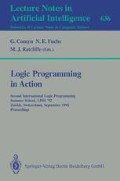Preview
Unable to display preview. Download preview PDF.
References
D. Bergantz and J. Hassell. Information relationships in Prolog programs: how do programmers comprehend functionality? International Journal of Man-Machine Studies, 35:313–328, 1991.
M. Brayshaw and M. Eisenstadt. Adding data and procedure abstraction to the Transparent Prolog Machine (TPM). In Proceedings of 5th Int. Conference and Symposium on Logic Programming, pages 532–547, Seattle, August 1988.
B. Bruegge and P. Hibbard. Generalized path expressions: A high-level debugging mechanism. The Journal of Systems and Software, 3:265–276, 1983.
A.D. Dewar and J.G. Cleary. Graphical display of complex information within a Prolog debugger. International Journal of Man-Machine Studies, 25(5):503–521, November 1986.
M. Ducassé. Abstract views of Prolog executions in Opium. In V. Saraswat and K. Ueda, editors, Proceedings of the International Logic Programming Symposium, pages 18–32, San Diego, October 1991. ALP, MIT Press.
M. Ducassé. Analysis of failing Prolog executions. In Actes des Journées Francophones sur la Programmation Logique, Mai 1992. University of Lille, France.
M. Ducassé. An extendable trace analyser to support automated debugging. PhD thesis, University of Rennes, France, June 1992. Numéro d'ordre 758. European Doctorate. In English.
M. Ducassé and A.-M. Emde. A high-level debugging environment for Prolog. Opium user's manual. Technical Report TR-LP-60, ECRC, May 1991.
M. Ducassé and A.-M. Emde. Opium: a debugging environment for Prolog development and debugging research. ACM Software Engineering Notes, 16(l):54–59, 1991.
M. Eisenstadt and M. Brayshaw. The Transparent Prolog Machine(TPM): an execution model and graphical debugger for logic programming. Journal of Logic Programming, 5(4):277–342, 1988.
A.-M. Emde and M. Ducassé. Automated debugging of non-terminating Prolog programs. In Proceedings of the ICLP'90 Pre-conference Workshop on Logic Programming Environments, June 1990.
M.S. Johnson. Dispel: A run-time debugging language. Computer languages, 6:79–94, 1981.
C.H. LeDoux and D.S. Parker. Saving traces for Ada debugging. In Proceedings of the ADA International Conference, pages 97–108, 1985.
M. Meier et al. SEPIA — an extendible Prolog system. In Proceedings of the IFIP '89, 1989.
M.L. Powell and M.A. Linton. A database model of debugging. In M.S. Johnson, editor, ACM SIGSOFT/SIGPLAN Software Engineering Symposium on high-level debugging, pages 67–70. ACM, March 1983.
E.Y. Shapiro. Algorithmic Program Debugging. MIT Press, Cambridge, MA, 1983.
L. Sterling and E. Shapiro. The Art of Prolog. MIT Press, Cambridge, Massachusetts, 1986.
Author information
Authors and Affiliations
Editor information
Rights and permissions
Copyright information
© 1992 Springer-Verlag Berlin Heidelberg
About this paper
Cite this paper
Ducassé, M. (1992). Opium — An advanced debugging system. In: Comyn, G., Fuchs, N.E., Ratcliffe, M.J. (eds) Logic Programming in Action. LPSS 1992. Lecture Notes in Computer Science, vol 636. Springer, Berlin, Heidelberg. https://doi.org/10.1007/3-540-55930-2_21
Download citation
DOI: https://doi.org/10.1007/3-540-55930-2_21
Published:
Publisher Name: Springer, Berlin, Heidelberg
Print ISBN: 978-3-540-55930-6
Online ISBN: 978-3-540-47312-1
eBook Packages: Springer Book Archive

